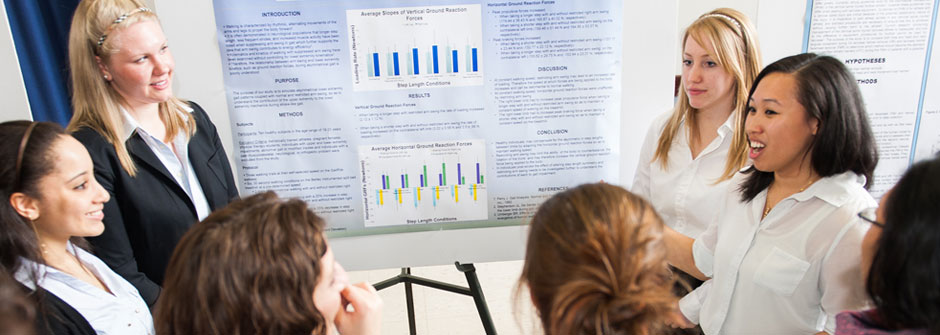
Curriculum
Our program overview outlines the goals and objectives of the D.P.T. program. More information about how these relate to the D.P.T. curriculum can be found in our Learning Outcomes section.
3-Year D.P.T. Curriculum
Curriculum Design
In order to meet these goals and outcomes, the faculty are committed to excellence
in teaching. Faculty employ tenets of adult learning to apply the movement system
model by fostering critical thinking and development of knowledge, skills, and behaviors
consistent with entry-level practice. To prepare the graduates for contemporary physical
therapy practice, the curriculum plan is 35-months long. The program is housed in
the School of Health and Medical Sciences located at the Interprofessional Health
Sciences Campus in Nutley, NJ. The curriculum incorporates the state-of-the-art learning
resources found within the new campus setting.
The curriculum affords the development of knowledge and skills consistent with contemporary physical therapy practice as well as servant leadership. Seton Hall University's DPT program includes didactic information plus experiential learning within the context of patient/client management model, community outreach, evidence-based practice and research, inter-professional education, simulations, and diverse clinical practice environments. The curriculum emphasizes the preparation of tomorrow's physical therapist as a specialist whose domain is within the movement system with the ability to critically think and apply treatment at the highest level of quality.
The program commences with a Summer Semester in July. The curricular plan, which includes academic and clinical courses designed to graduate practitioners as movement specialists, aligns with healthcare trends and the University's mission to form servant leaders.
Course Listing
The following is a list of the courses that students will pursue throughout the three-year D.P.T. program.
First Professional Year
Summer, Fall and Spring Semesters
- Physiology I, II & III
- Kinesiology I, II & III
- Critical Thinking and the Clinical Reasoning Process
- Professional Roles in Physical Therapy
- Human Anatomy
- Clinical Assessment and Diagnostic Skills I & II
- Therapeutic Interventions I & II
- Critical Inquiry I & II
- Neuroscience
- Community Health and Wellness Outreach I* (or taken in Second Professional Year)
Second Professional Year
Summer, Fall and Spring Semesters
- Pharmacology
- Clinical Assessment and Diagnostic Skills III
- Therapeutic Interventions III & IV
- Community Health and Wellness Outreach I* & II (*if not taken in First Professional Year)
- Movement Development Across the Lifespan
- Clinical Diagnostics and Management (CDM) I-VI
-
- Cardiovascular and Pulmonary Conditions
- Congenital and Developmental Conditions
- Lower Quarter Musculoskeletal Conditions
- Upper Quarter Musculoskeletal Conditions
- Neurological Conditions
- Integumentary Conditions
- Pyschosocial and Ethical Issues in Health Care
- Management and Regulatory Issues in Health Care
- Optional Electives: Clinical Research Experience I & II
Third Professional Year
Summer, Fall and Spring Semesters
- Clinical Education Seminar
- Clinical Diagnostics and Management (CDM) VII-VIII
- Progressive multi-system conditions and Urogenital conditions
- Clinical Internship I, II & III
- Clinical Reasoning: Capstone Project I, II & III
- Professional Development and Leadership Seminar
View the Seton Hall University Doctor of Physical Therapy Curriculum Plan »
Full course descriptions are available in the Graduate Catalogue.
Clinical Education
The clinical education aspect of the D.P.T. program is a coordinated effort between
Seton Hall University and various clinical sites throughout our area. Dedicated clinical
education faculty work with these sites in order to place our students for progressive
internship assignments, leading to three full-time internships during the third professional
year.
Seton Hall is in a prime location that allows exposure to diverse and challenging
physical therapy practice settings such as hospitals, rehabilitation centers, public
and specialty schools and private practices in the New Jersey and New York metropolitan
area, as well as out of state and out of the country.
Background Check
Students who are pursuing a degree in physical therapy need to be aware of certain
elements that potentially can impact clinical placement, licensure and future employment.
Federal and various state laws are in place that preclude persons with criminal backgrounds
from being in contact with children and patients. Where these laws apply, you will
be required to undergo a criminal background check, which may include fingerprinting
and a search of federal and state criminal databases. Drug testing may also be required.
A felony conviction may affect a student's ability to complete the program or a graduate's
ability to sit for the NPTE examination and/or attain state licensure.

